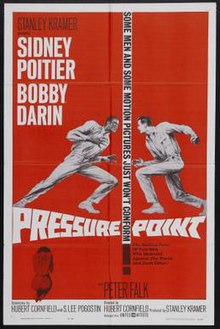
Sidney Poitier was a Bahamian and American actor, film director, and diplomat. In 1964, he was the first Black actor and first Bahamian to win the Academy Award for Best Actor. He received two competitive Golden Globe Awards, a BAFTA Award, and a Grammy Award as well as nominations for two Emmy Awards and a Tony Award. In 1999, he ranked among one of the "American Film Institute's 100 Stars". Poitier was one of the last surviving stars from the Golden Age of Hollywood cinema.

The Snake Pit is a 1948 American psychological drama film directed by Anatole Litvak and starring Olivia de Havilland, Mark Stevens, Leo Genn, Celeste Holm, Beulah Bondi, and Lee Patrick. Based on Mary Jane Ward's 1946 semi-autobiographical novel of the same name, the film recounts the tale of a woman who finds herself in an insane asylum and cannot remember how she got there.
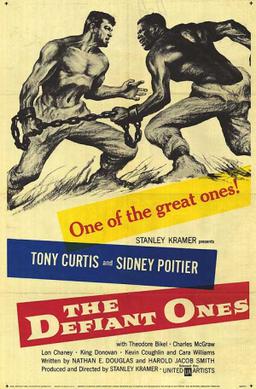
The Defiant Ones is a 1958 American adventure drama film which tells the story of two escaped prisoners, one white and one black, who are shackled together and who must co-operate in order to survive. It stars Tony Curtis and Sidney Poitier.

Doctor Dolittle is a 1967 American musical comedy film directed by Richard Fleischer and starring Rex Harrison, Samantha Eggar, Anthony Newley, and Richard Attenborough. It was adapted by Leslie Bricusse from the Doctor Dolittle novel series by Hugh Lofting, primarily The Story of Doctor Dolittle (1920), The Voyages of Doctor Dolittle (1922), and Doctor Dolittle's Circus (1924).
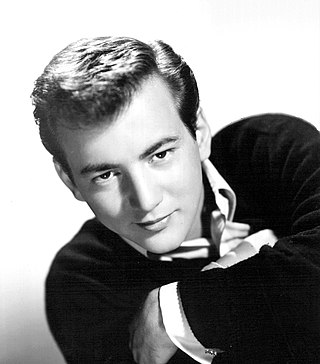
Bobby Darin was an American musician, songwriter and actor. He performed jazz, pop, rock and roll, folk, swing, and country music.
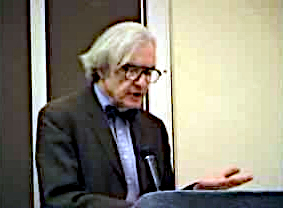
Robert Jay Lifton is an American psychiatrist and author, chiefly known for his studies of the psychological causes and effects of wars and political violence, and for his theory of thought reform. He was an early proponent of the techniques of psychohistory.
Section 8 was a category of discharge from the United States military, used for a service member judged mentally unfit for service. Section 8 was also often given to cross-dressers, gay, lesbian, bisexual and transgender people.
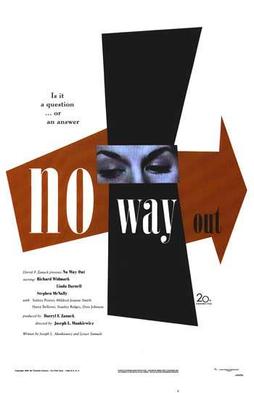
No Way Out is a 1950 American film noir crime drama film directed by Joseph L. Mankiewicz, and starring Richard Widmark, Linda Darnell, Sidney Poitier, and Stephen McNally, who portrays a doctor tending to slum residents whose ethics are tested when confronted with racism, personified by Widmark as hateful robber Ray Biddle.

Ivan Nathaniel Dixon III was an American actor, director, and producer best known for his series role in the 1960s sitcom Hogan's Heroes, and for his starring roles in the 1964 independent drama Nothing But a Man and the 1967 television film The Final War of Olly Winter. In addition, he directed many episodes of television series.

The Slender Thread is a 1965 American drama film starring Anne Bancroft and Sidney Poitier. It was the first feature-length film directed by future Oscar-winning director, producer and actor Sydney Pollack.
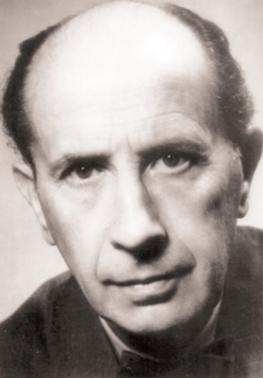
Karl Kleist was a German neurologist and psychiatrist who made notable advances in descriptive psychopathology and neuropsychology. Kleist coined the terms unipolar (‘einpolig’) and bipolar (‘zweipolig’) that are now used in the concepts of unipolar depression and bipolar disorder. His main publications were in the field of neurology, and he is particularly known for his work on the localisation of function in the cerebral cortex of man including mapping of cortical functions on brain maps. The work is based on several hundred cases of shot wounded patients of World War I, whose functional deficits Kleist deliberately studied and described in detail during their lifetime. Later on, by means of brain autopsy, he documented the lesion and was, thus, able to localize brain function in each single case doing this also on cytoarchitectonical grounds. Kleist was a student of Carl Wernicke and his work was closely associated with the Wernicke tradition. Among his students were Edda Neele and Karl Leonhard, who further developed the Kleist-Leonhard classification system of psychosis.

Edge of the City is a 1957 American film-noir drama film directed by Martin Ritt in his directorial debut, and starring John Cassavetes and Sidney Poitier. Robert Alan Aurthur's screenplay was expanded from his original script, staged as the final episode of Philco Television Playhouse, A Man Is Ten Feet Tall (1955), also featuring Poitier.

Johann Friedrich Karl Asperger was an Austrian physician. Noted for his early studies on atypical neurology, specifically in children, he is the namesake of the autism spectrum disorder Asperger syndrome. He wrote more than 300 publications on psychological disorders that posthumously acquired international renown in the 1980s. His diagnosis of autism, which he termed "autistic psychopathy", also garnered controversy. Further controversy arose during the late 2010s over allegations that Asperger referred children to a Nazi German clinic responsible for murdering disabled patients, although his knowledge and involvement remains unknown.

The Interns is a 1962 American drama film directed by David Swift and starring Michael Callan, Cliff Robertson, James MacArthur, Nick Adams, Haya Harareet and Suzy Parker. The film was followed by a 1964 sequel, The New Interns, and a 1970–1971 television medical drama series, The Interns, that was based on the films. The Interns was directed by David Swift.
A pressure point is an area on the human body that may produce significant pain or other effects when manipulated.
Political abuse of psychiatry, also commonly referred to as punitive psychiatry, is the misuse of psychiatry, including diagnosis, detention, and treatment, for the purposes of obstructing the human rights of individuals and/or groups in a society. In other words, abuse of psychiatry is the deliberate action of having citizens psychiatrically diagnosed who need neither psychiatric restraint nor psychiatric treatment. Psychiatrists have been involved in human rights abuses in states across the world when the definitions of mental disease were expanded to include political disobedience. As scholars have long argued, governmental and medical institutions code menaces to authority as mental diseases during political disturbances. Nowadays, in many countries, political prisoners are sometimes confined and abused in psychiatric hospitals.
The Doctor's Horrible Experiment is a 1959 French black-and-white television film directed by Jean Renoir. It has been released in the United Kingdom as Experiment in Evil and on DVD as The Testament of Doctor Cordelier. The film is a retelling of the 1886 novella Strange Case of Dr Jekyll and Mr Hyde by Robert Louis Stevenson set in 1950s France. Jean-Louis Barrault plays Dr. Cordelier/Opale, the substitute for Dr. Jekyll/Hyde character; the film is also known for its visual style that is far above the normal television programs of the 1950s.

Virgin Island is a 1958 British drama film directed by Pat Jackson and starring John Cassavetes, Virginia Maskell and Sidney Poitier. It is an adaptation of the memoir Our Virgin Island by Robb White and was filmed on the British Virgin Islands. The American release in 1960 followed the title of the novel.

Clinical is a 2017 American horror thriller film directed by Alistair Legrand and written by Luke Harvis and Alistair Legrand. The film stars Vinessa Shaw, Kevin Rahm, India Eisley, Aaron Stanford, Nestor Serrano, Sydney Tamiia Poitier, and Wilmer Calderon. The film was released on Netflix on January 13, 2017.
Spring 1941 is a 2008 Polish-Israeli war drama film directed by Uri Barbash and starring Joseph Fiennes, Neve McIntosh and Kelly Harrison. It is based on the short stories "A Conversation" and "A Spring Morning" by Ida Fink.
